KHIEV Pirom
Research Fellow
Ms Khiev Pirom is working as research fellow in Center for Policy Research in Agriculture and Rural Development (CPARD) of CDRI. She has experiences in both quantitative and qualitative research approach with a focus on food security and nutrition, rural livelihood and rural development, and strengths in data collection, data management and data analysis. Before joining CDRI, she worked as data analyst at Indochina Research Co. Ltd where she was responsible for preparing and designing databases for data entry as well as analysis. She holds a Master of Development Studies from Royal University of Phnom Penh.


Due to the April 2025 announcement of new, country-specific United States (US) import tariffs, bilateral trade relationships with the US have taken center stage in developing countries, especially small, export-oriented economies like Cambodia. Exports to the US are about 33% of total Cambodian exports and worth 25% of gross domestic product (G...

There are many studies about rice production in Cambodia, but none focus on the geographical location of rice production, particularly in the south-eastern provinces of Prey Veng, Takeo and Svay Rieng. Farmers in these areas produce mainly low-value rice (IR504) most of which is exported as wet paddy to Vietnam. The Vietnamese government recently d...

This study examines the benefits, risks and costs of changing from flood recession to intensive irrigated agriculture in Cambodia. Methods used include food supply calculation, nutritional supply estimation, potential production area projection, water use estimation, and energy consumption estimation. Three scenarios were designed to model current...
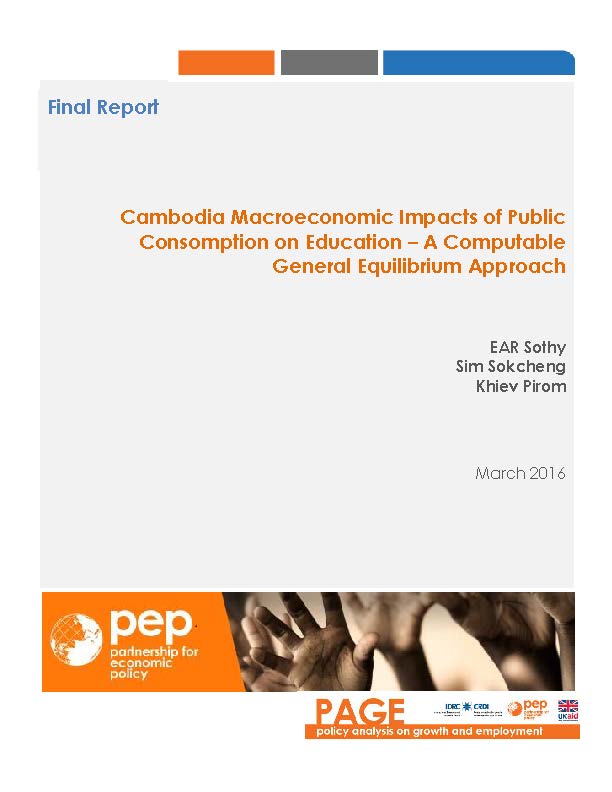
Lack of human capital is seen as one of the most significant constraints for Cambodia to be more competitive and to reach upper-middle-income country status. A recent discussion among researchers, policymakers, the private sector and development partners reached a broad consensus that a skills gap is emerging in Cambodia. In spite of concerted effo...
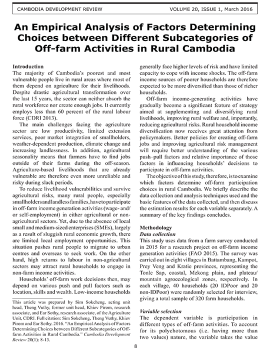
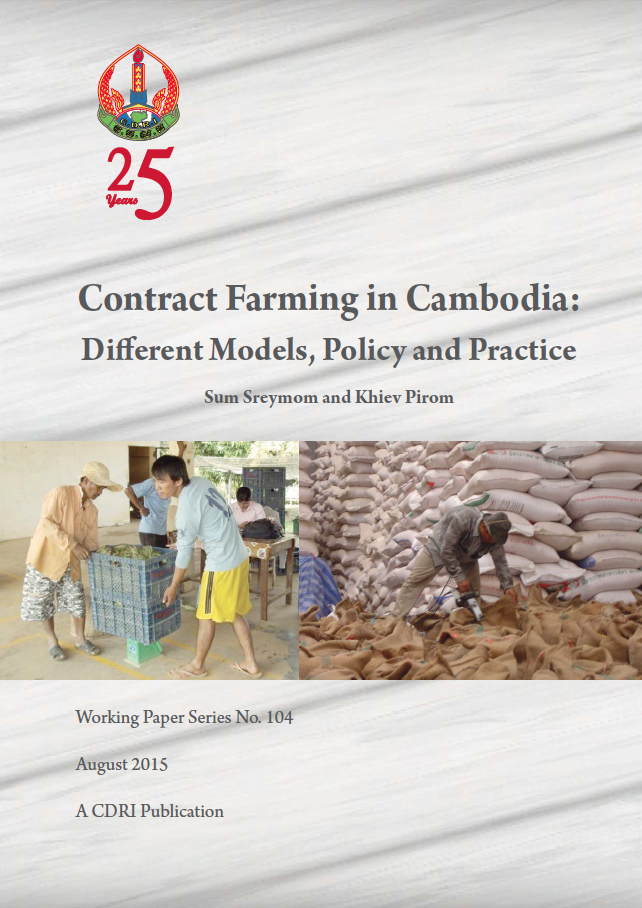
Contract farming (CF) is increasingly seen as an effective mechanism to maximise the inclusion of and benefits for small-scale farmers, while giving some control over production to agribusinesses without requiring land ownership. In Cambodia, CF takes many forms and involves food and industrial crops, yet the different CF models and...

This study assesses the impact of participation in farmer organisations (FOs) on the food security of rural households in Cambodia. The study was started in November 2010 and completed in June 2012. The study set out to: (1) examine the roles, operations and challenges of FOs in improving household food security; (2) analyse the household characte...

This study examines the development of Cambodia’s fertiliser industry, focusing on market structure, demand and supply challenges, and policy directions. Fertiliser plays a vital role in agricultural intensification, contributing to increased crop yields, food security, and rural incomes. Despite rapid growth in fertiliser use, Cambodian farmers fa...
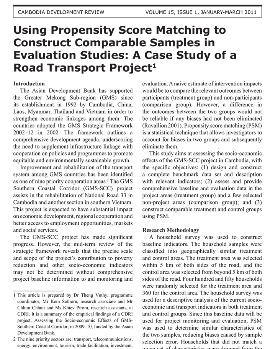
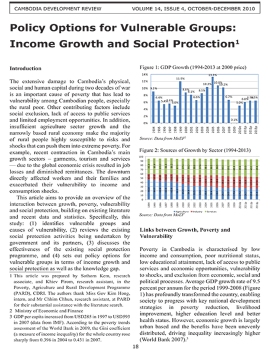

Effective public service delivery is a cornerstone of socio-economic development, ensuring services reach citizens efficiently and equitably. Over the past decade, Cambodia has made notable progress in improving its Public Financial Management system. The Public Financial Management Reform Program (PFMRP) has played a crucial role in enhancing budg...

Effective public service delivery is a cornerstone of socio-economic development, ensuring services reach citizens efficiently and equitably. Over the past decade, Cambodia has made notable progress in improving its Public Financial Management system. The Public Financial Management Reform Program (PFMRP) has played a crucial role in enhancing budg...
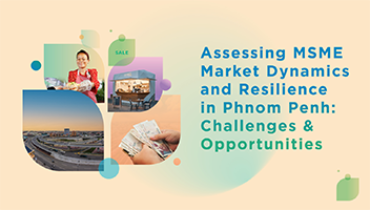
Micro, small, and medium enterprises (MSMEs) form the backbone of Phnom Penh’s urban economy, yet they are increasingly pressured by economic slowdown, and digital disruption. High business turnover reflects survival-driven entrepreneurship, with most firms remaining informal, micro-scale, and concentrated in low-productivity sectors. Given the...

The AGROW project in Cambodia, led by Veterinarians Without Borders (VWB) with partners AVSF Cambodia and ADA, focuses on training women farmers in sustainable agriculture and livestock production to enhance financial and nutritional outcomes. Running from 2022 to December 15, 2024, the program targets climate-smart practices in cricket, chicken, c...

The Cambodia Nutrition Project (CNP) is a seven-year, US$62.5 million project to anchor the RGC’s enhanced and coordinated response to accelerate the human capital formation focusing on maternal and child health and nutrition (MCHN) in the early years. The CNP addresses Cambodia’s persistent high levels of stunting and aims to close equity gap...

Chilies are one of the most important and widely consumed spices in Cambodia, as well as a source of income for many smallholder farmers. However, chilies production faces several challenges, such as low productivity, high input costs, pest and disease outbreaks, lack of quality seeds and planting materials, poor post-harvest handling and marketing...
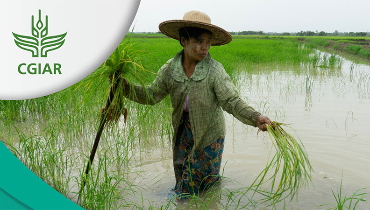
To address urgent concerns on climate change, the CGIAR, together with its centres and development partners, is officially launching the Securing the Food Systems of Asian Mega-Deltas for Climate and Livelihood Resilience (AMD). The initiative aims to create resilient, inclusive, and productive deltas by removing systemic barriers to the scaling of...
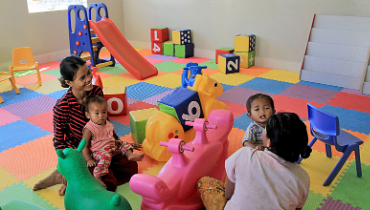
The World Bank’s East Asia and Pacific Chief Economist Office is preparing a regional flagship report on childcare. The report is exploring how childcare availability can promote equity and growth objectives and how childcare can be designed to balance the dual objectives of promoting children’s development and mothers’ labour force participation....

To improve undernutrition challenge, a five-year The Cambodia Nutrition Project (CNP) was formulated with The MOH and the National Committee for Sub-national Democratic Development (NCDDS) of the Ministry of Interior are the implementing agencies. The project brings together global evidence on effective interventions with Cambodia’s priorities to d...
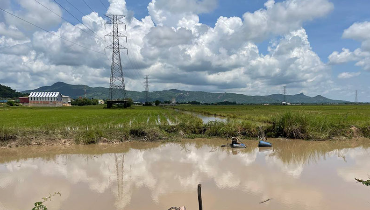
More than 60 percent of Cambodia farmers grow rice, also, rice farmers mostly are smallholder suffering from low productivity, inadequate infrastructure, and vulnerability to flooding and drought. Remote smallholders might not benefit from existing irrigation system. Supported by IFAD-NARDT, the study is policy relevant which will provide evident...
